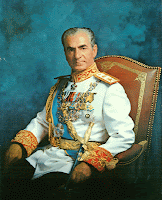The Days of Iran's Last Shah, Mohammed Reza Pahlavi

"Shah is a kind of magic word with the Persian people. " Mohammed Reza Pahlavi, Shah of Iran 1941-1979 The Iranian past, similar to the Russian past, has been hidden for decades. Little did Stalin know in the 1930s that forcing a policy of kolkhozy or collectivization of peasants' lands, would create a radical resistance movement among the kulaks and peasants against collectivization. The Shah of Iran was not Stalin, in fact, comparably far from him. But his White Revolution as he phrased it, beginning in 1963 and ending in 1977, mobilized semi-industrial peasants known as the bazaaris in an alliance with the religious clerics against rapid modernization and the Shah. These modernization policies introduced a series of land reforms and Westernizing trends that would elevate Iran onto an industrialist and capitalist platform alongside the major Western powers of the day. The problem with the Shah's policies were not that he sought to ring in capitalism to the Iranian



